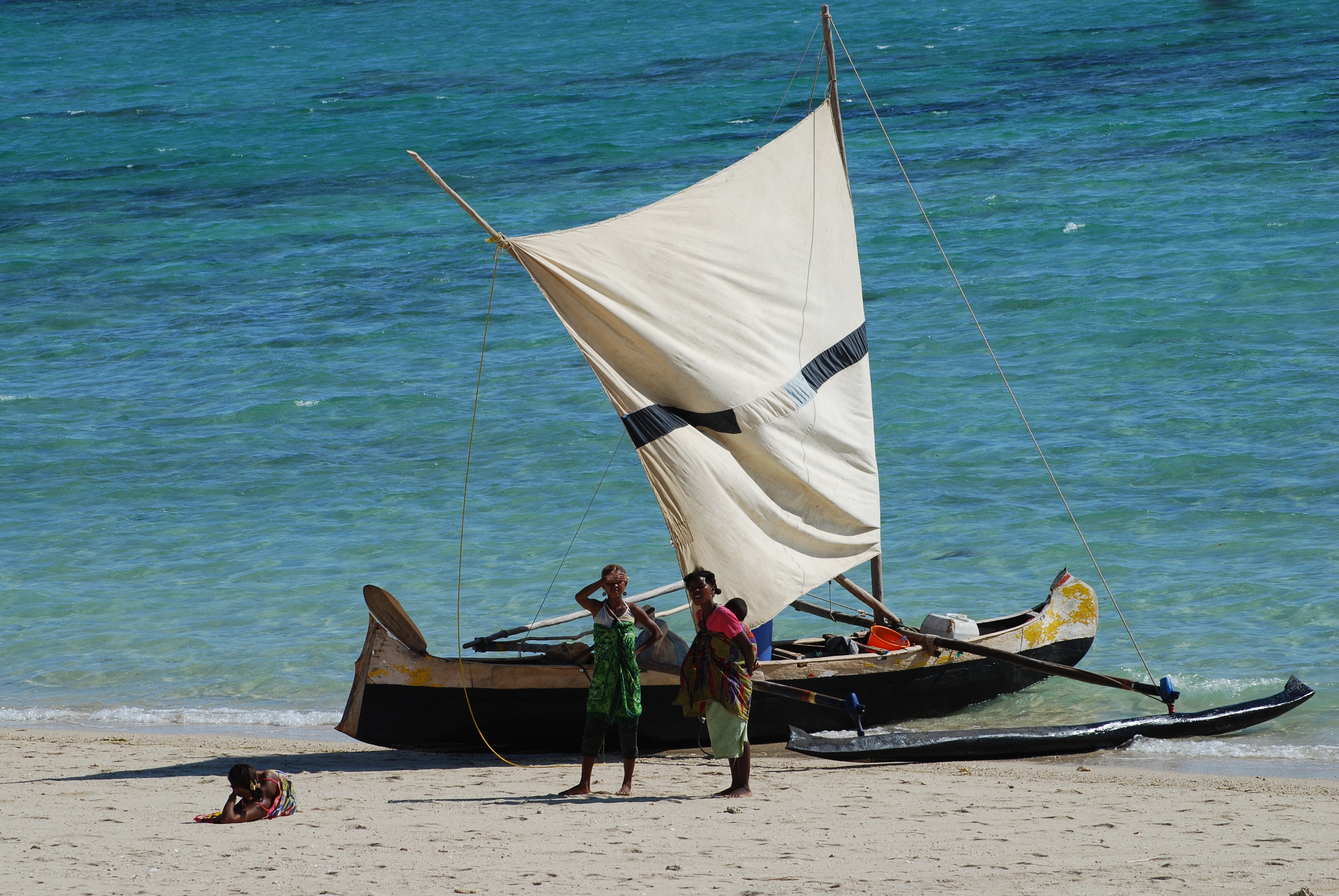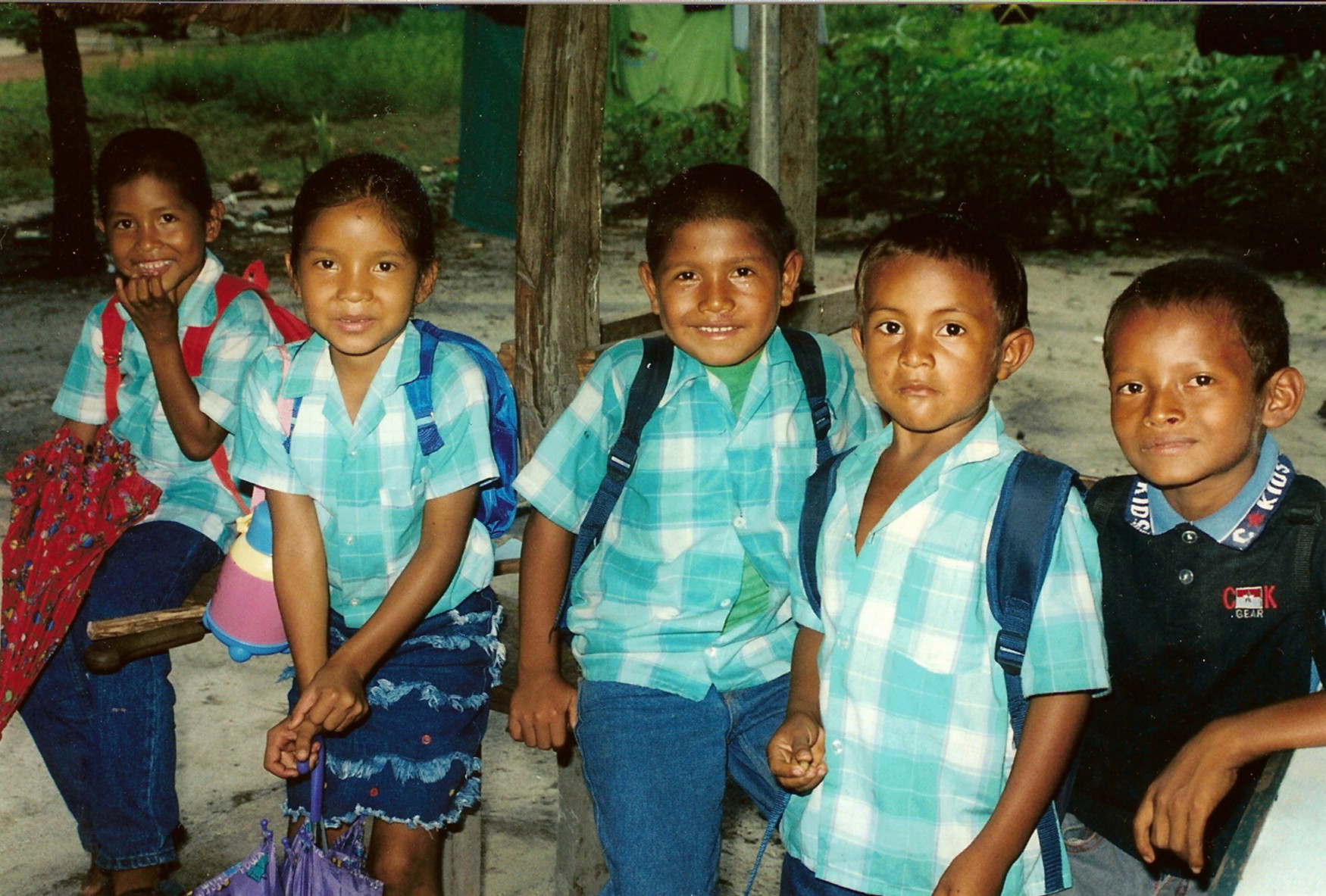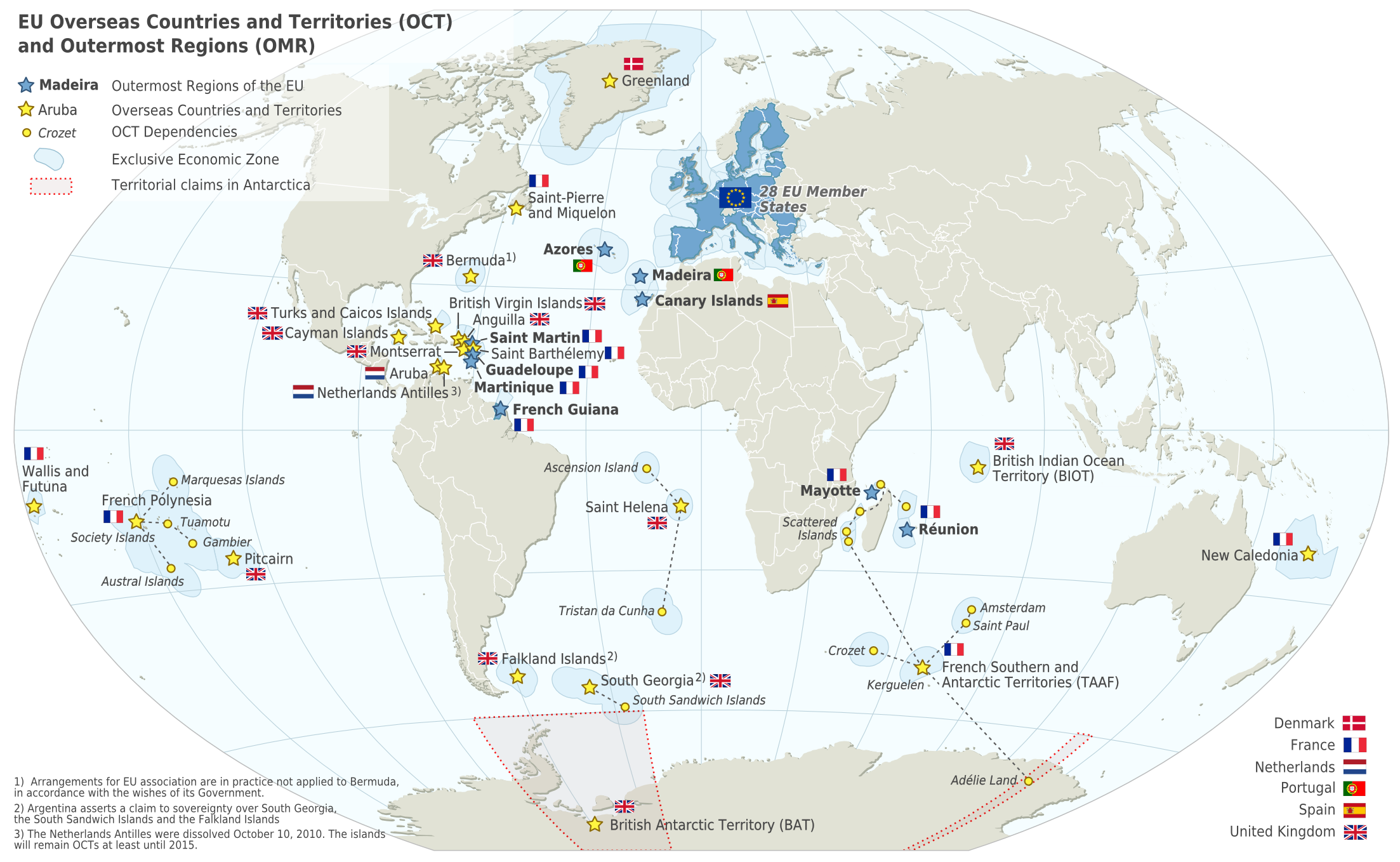|
ĂŽle Portal
Île Portal is an island in the Maroni River in the commune of Saint-Laurent-du-Maroni, French Guiana. The island measures 27 km2 History In 1852, Constant Bar started a plantation on the island to produce coffee, sugar and wood. The workforce consisted of African and East-Indian immigrants, and French convicts from the penal colony. In 1878, the island was visited by the explorer Jules Crevaux who noted that four brothers were operating the plantation. In the early 20th century, the island was bought by Talon who started a distillery on the island. In 1964, the distillery and the buildings burnt down in a fire. Indigenous inhabitants About 200 Kalina Amerindians used to live on the island. In the late 1970s, the island was bought by SCI de Provence, a real estate company, who wanted the Amerindians off their land. In 1981, they were told to leave the island, and resettle in Espérance. In 1983, the Prefecture of French Guiana refused to forcibly remove the remaining population ... [...More Info...] [...Related Items...] OR: [Wikipedia] [Google] [Baidu] |
France
France (), officially the French Republic ( ), is a country primarily located in Western Europe. It also comprises of Overseas France, overseas regions and territories in the Americas and the Atlantic Ocean, Atlantic, Pacific Ocean, Pacific and Indian Oceans. Its Metropolitan France, metropolitan area extends from the Rhine to the Atlantic Ocean and from the Mediterranean Sea to the English Channel and the North Sea; overseas territories include French Guiana in South America, Saint Pierre and Miquelon in the North Atlantic, the French West Indies, and many islands in Oceania and the Indian Ocean. Due to its several coastal territories, France has the largest exclusive economic zone in the world. France borders Belgium, Luxembourg, Germany, Switzerland, Monaco, Italy, Andorra, and Spain in continental Europe, as well as the Kingdom of the Netherlands, Netherlands, Suriname, and Brazil in the Americas via its overseas territories in French Guiana and Saint Martin (island), ... [...More Info...] [...Related Items...] OR: [Wikipedia] [Google] [Baidu] |
Distillery
Distillation, or classical distillation, is the process of separating the components or substances from a liquid mixture by using selective boiling and condensation, usually inside an apparatus known as a still. Dry distillation is the heating of solid materials to produce gaseous products (which may condense into liquids or solids); this may involve chemical changes such as destructive distillation or cracking. Distillation may result in essentially complete separation (resulting in nearly pure components), or it may be a partial separation that increases the concentration of selected components; in either case, the process exploits differences in the relative volatility of the mixture's components. In industrial applications, distillation is a unit operation of practically universal importance, but is a physical separation process, not a chemical reaction. An installation used for distillation, especially of distilled beverages, is a distillery. Distillation includes the f ... [...More Info...] [...Related Items...] OR: [Wikipedia] [Google] [Baidu] |
Islands Of French Guiana
The following are lists of the islands of South America by country. Argentina Atlantic Ocean islands *'' Isla ApipĂ©'' *''Isla Bermejo'' *''Isla de los Estados'' *'' Isla de San MartĂn'' *''Isla del Cerrito'' *''Isla MartĂn GarcĂa'' *'' Isla Trinidad (Buenos Aires)'' * Patagonic Archipelago **'' ArchipiĂ©lago de Tierra del Fuego'' ***''Isla Grande de Tierra del Fuego'' (divided with Chile) ***''Isla de los Estados'' ***''Islas Malvinas, Georgias y Sandwich del Sur'' Lake islands *''Isla Huemul'' *''Isla Victoria'' River islands *Islands of the Paraná River delta **''Islas del Ibicuy'' Bolivia Bolivia is a landlocked country with no ocean islands. Lake islands *''Isla del Pescado'' (Incahuasi Island) *''Isla del Sol'' *''Isla de la Luna'' Brazil Atlantic Ocean islands *'' Arquipelago de Fernando de Noronha'' *''ArquipĂ©lago de SĂŁo Pedro e SĂŁo Paulo'' (Saint Peter and Paul Rocks) *''Atol das Rocas'' (Rocas Atoll) *'' Ilha de Boipeba'' *'' Ilha de Maraca'' ... [...More Info...] [...Related Items...] OR: [Wikipedia] [Google] [Baidu] |
Pirogue
A pirogue ( or ), also called a piragua or piraga, is any of various small boats, particularly dugouts and native canoes. The word is French and is derived from Spanish , which comes from the Carib '. Description The term 'pirogue' does not refer to a specific kind of boat, but is a generic term for small native boats in regions once colonized by France and Spain, particularly dugouts made from a single log. In French West Africa, the term refers to handcrafted banana-shaped boats used by traditional fishermen. In Madagascar, it also includes the more elaborate Austronesian ''lakana'' outrigger canoe. Pirogues are usually propelled by paddles that have one blade (as opposed to a kayak paddle, which has two). It can also be punted with a push pole in shallow water. Small sails are built by local fishermen, and they can also be employed. There are two types of sails with differences in their shapes: the square one is used mainly for fishing near the coast and is only useful ... [...More Info...] [...Related Items...] OR: [Wikipedia] [Google] [Baidu] |
Prefecture
A prefecture (from the Latin ''Praefectura'') is an administrative jurisdiction traditionally governed by an appointed prefect. This can be a regional or local government subdivision in various countries, or a subdivision in certain international church structures, as well as in antiquity a Roman district. Literal prefectures Antiquity ''Prefecture'' originally refers to a self-governing body or area since the tetrarchy, when Emperor Diocletian divided the Roman Empire into four districts (each divided into dioceses), grouped under ''a Vicarius'' (a number of Roman provinces, listed under that article), although he maintained two pretorian prefectures as an administrative level above the also surviving dioceses (a few of which were split). Ecclesiastic As canon law is strongly inspired by Roman law, it is not surprising that the Catholic Church has several offices under a prefect. That term occurs also in otherwise styled offices, such as the head of a congregation or departmen ... [...More Info...] [...Related Items...] OR: [Wikipedia] [Google] [Baidu] |
Espérance, French Guiana
Espérance (Kalina language, Kalina: ''Wilamila'') is a village of Kalina people, Kalina Amerindians in the Communes of France, commune of Saint-Laurent-du-Maroni. The village is located about 12 kilometres south of Saint-Laurent-du-Maroni on the road to Saint-Jean-du-Maroni. Overview About 200 Kalinas used to live on Île Portal, an island in the Maroni River. The island on which they lived was bought by SCI de Provence. In 1981, they were removed from the island and resettled in Espérance. Espérance has a school. The village can be accessed by an unpaved road. Two companies are located near the village, and their heavy trucks make the road impassable. In 2006, the main road to Saint-Jean-du-Maroni was blocked by the villagers. In 2020, Claire-Suzanne Poulin was elected Yopoto (village chief). Poulin aims to open a heritage school in the village where the Kalina language and traditions are taught. References [...More Info...] [...Related Items...] OR: [Wikipedia] [Google] [Baidu] |
Amerindians
The Indigenous peoples of the Americas are the inhabitants of the Americas before the arrival of the European settlers in the 15th century, and the ethnic groups who now identify themselves with those peoples. Many Indigenous peoples of the Americas were traditionally hunter-gatherers and many, especially in the Amazon basin, still are, but many groups practiced aquaculture and agriculture. While some societies depended heavily on agriculture, others practiced a mix of farming, hunting, and gathering. In some regions, the Indigenous peoples created monumental architecture, large-scale organized cities, city-states, chiefdoms, states, kingdoms, republics, confederacies, and empires. Some had varying degrees of knowledge of engineering, architecture, mathematics, astronomy, writing, physics, medicine, planting and irrigation, geology, mining, metallurgy, sculpture, and gold smithing. Many parts of the Americas are still populated by Indigenous peoples; some countries have sizea ... [...More Info...] [...Related Items...] OR: [Wikipedia] [Google] [Baidu] |
Kalina People
The Kalina, also known as the Caribs or mainland Caribs and by several other names, are an indigenous people native to the northern coastal areas of South America. Today, the Kalina live largely in villages on the rivers and coasts of Venezuela, Guyana, Suriname, French Guiana, and Brazil. They speak a Cariban language known as Carib. They may be related to the Island Caribs of the Caribbean, though their languages are unrelated. Name The exonym ''Caribe'' was first recorded by Christopher Columbus. One hypothesis for the origin of ''Carib'' is that it means "brave warrior". Its variants, including the English ''Carib'', were then adopted by other European languages. Early Spanish explorers and administrators used the terms ''Arawak'' and ''Caribs'' to distinguish the peoples of the Caribbean, with ''Carib'' reserved for indigenous groups that they considered hostile and ''Arawak'' for groups that they considered friendly. The Kalina call themselves ''Kalina'' or ''Karìna'' , ... [...More Info...] [...Related Items...] OR: [Wikipedia] [Google] [Baidu] |
Jules Crevaux
Jules Crevaux (1847–1882) was a French doctor, soldier, and explorer. He is known for his multiple explorations into the interior of French Guiana and the Amazon. Biography Jules Crevaux was born on April 1, 1847 in the north-eastern French town of Lorquin. He began to study medicine at the University of Strasbourg before being transferred to the French Navy's medical school at Brest. In 1868 he was assigned to the ''Cérès'' as a medical assistant and served in Senegal, the French West Indies and French Guiana. At the beginning of the Franco-Prussian War in 1870, he volunteered to serve as a marine. He was sent to the Loire Valley where he was wounded and captured by Prussian forces on December 17, 1870. He escaped soon after and was wounded again on January 24, 1871. Following the war, he completed his medical studies and was granted his M.D.. He was appointed as chief physician on the ''La Motte-Piquet.'' He was sent to the colony of French Guiana in 1876. The ... [...More Info...] [...Related Items...] OR: [Wikipedia] [Google] [Baidu] |
Overseas Region
The overseas departments and regions of France (french: départements et régions d'outre-mer, ; ''DROM'') are departments of France that are outside metropolitan France, the European part of France. They have exactly the same status as mainland France's regions and departments. The Constitution of France, French Constitution provides that, in general, French laws and regulations (France's civil code, penal code, administrative law, social laws, tax laws, etc.) apply to French overseas regions the same as in metropolitan France, but can be adapted as needed to suit the region's particular needs. Hence, the local administrations of French overseas regions cannot themselves pass new laws. As integral parts of France and the European Union, overseas departments are represented in the National Assembly (France), National Assembly, Senate (France), Senate, and French Economic, Social and Environmental Council, Economic and Social Council, vote to elect members of the European Parlia ... [...More Info...] [...Related Items...] OR: [Wikipedia] [Google] [Baidu] |
Prison Of St-Laurent-du-Maroni
The prison of Saint-Laurent-du-Maroni was the main penal colony in French Guiana for more than a century. Some of the buildings were restored in the early 1980s. History On 22 November 1850, Napoleon III of France, Napoleon III declared: "Six thousand condemned men in our prisons weigh heavily on our budget, becoming increasingly depraved and constantly menacing our society. I think it is possible to make the sentence of forced labour more effective, more moralising, less expensive and more humane by using it to further the progress of French colonisation." The first batch of prisoners left the Breton port of Brest, France, Brest for the ĂŽles du Salut on 31 March 1852. The prison at St-Laurent-du-Maroni was established on the banks of the Maroni River on 21 February 1858. All the prisoners sent from France were taken there before being transferred to other prisons or camps. The town of Saint-Laurent-du-Maroni proper was founded on 16 March 1880; it was a penal town whose in ... [...More Info...] [...Related Items...] OR: [Wikipedia] [Google] [Baidu] |


_2007.jpg)


